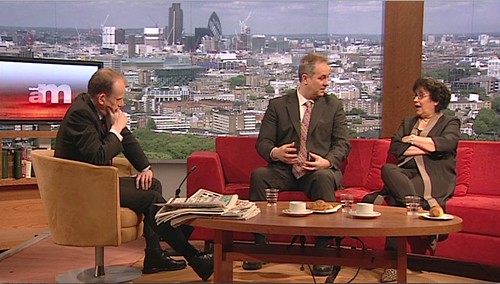Attention journalists: Focus on blog signal, not noise
There are clearly still many journalists who don’t quite understand the phenomenon of blogging and are willing to throw the baby out with the bathwater because there are some bloggers who they don’t like (and who don’t like them).
A perfect example was Independent columnist Yasmin Alibhai-Brown, who sparred with political blogger Iain Dale on Andrew Marr’s Sunday AM programme this morning (RealAudio video @ approx 29:00).
Alibhai-Brown has plenty of reasons to be aggrieved about blogs, of course. As a liberal columnist, she has been on the receiving end of some incredibly vitriolic abuse from some of the less civilised sections of Britain’s right wing political blogosphere.
The problem is that she, like so many others, confuses message with medium and equates all bloggers with the her (relatively) small number of right-wing detractors, from whom she says she has even received threats and intimidation.
Blogging, she said, “is the equivalent of going to the pub and listening to complete bores sounding off.”
The problem, of course, is that alongside bores and crazies, pubs also entertain experts in any given field discussing the issues they encounter in their professional lives. There are also plenty of rational, ordinary people with interesting stories to tell about the challenges they face in their lives.
“I hope that [blogging] keeps growing and growing until it collapses because nobody will have time to read it all,” Alibhai-Brown to close the segment.
But it has already reached that point. Nobody can read all 60-odd million blogs. The vast majority of blogs have a readership that you could count on your fingers and toes. And there’s a reason for that: most blogs are interesting only to the bloggers themselves and five of their best friends.
Because blogs cost nearly nothing to produce, there is no pressure to publish only the best-quality material. Unlike big media’s edit-then-publish model, blogs operate on a publish-then-edit model.
In the age of information overload, journalists must be experts at using filtering technologies like Google and Technorati — not to mention their own critical judgment — to help guide their time-pressed readers to separate signal from noise.
Unfortunately, many journalists, like Alibhai-Brown, continue to focus instead on the noise, missing the signal in the process.
They walk into the pub, hear the banter of drunken idiots in the front, and walk out in disgust — not realising that they are missing a lively and well-informed discussion going on at the quiet table in the back.
/2007/02/11/attention-journalists-focus-on-blog-signal-not-noise/
